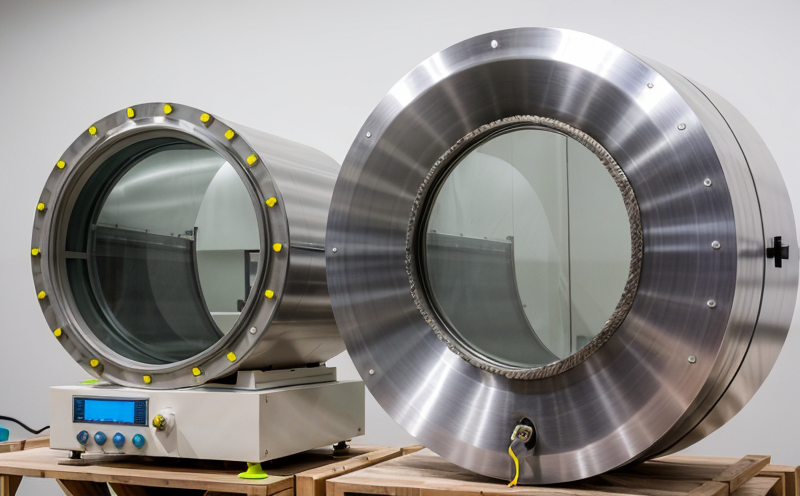ISO 22962 Shielding Effectiveness of Polymer-Matrix Composites
The International Standard ISO 22962 provides a robust framework to evaluate the shielding effectiveness of polymer-matrix composites (PMCs) against ionizing radiation. This standard is particularly relevant for industries that rely on materials capable of reducing radiation exposure in high-risk environments such as nuclear power plants, medical facilities, and space exploration.
The test procedure outlined in ISO 22962 focuses on the ability of PMCs to attenuate gamma rays and other forms of ionizing radiation. The standard specifies detailed methods for preparing specimens, conducting tests under controlled conditions, and interpreting results. Specimens are typically cut into standardized shapes and sizes to ensure consistent testing across different materials.
The process begins with selecting a representative sample of the polymer-matrix composite material. This involves precise cutting and grinding to achieve uniform thicknesses necessary for accurate measurements. Once prepared, these samples undergo irradiation using a calibrated gamma source or equivalent radiation field. The amount of radiation absorbed by the material is then measured using sensitive detectors.
The core of ISO 22962 lies in its stringent requirements for instrumentation and measurement techniques. High-resolution detectors are used to quantify the attenuation level, which directly correlates with the shielding effectiveness of the composite. This data is crucial not only for compliance but also for optimizing material design based on real-world performance metrics.
Compliance with ISO 22962 ensures that manufacturers adhere to international standards set by industry leaders. This standardization enhances trust in products and facilitates global trade, making it a critical component of quality management systems within the sector.
The importance of this test cannot be overstated, especially in sectors where radiation exposure is an occupational hazard. By ensuring materials meet or exceed shielding effectiveness requirements, ISO 22962 contributes significantly to worker safety and regulatory compliance. This service plays a pivotal role in safeguarding human health and preventing potential accidents associated with improper material selection.
The detailed methodology described in the standard allows for precise quantification of radiation attenuation properties. It enables manufacturers to tailor their products effectively, addressing specific application needs accurately. The reliability provided by ISO 22962 is essential for industries relying heavily on safe handling practices and robust design principles.
Industry Applications
1. Nuclear Power Plants:
| Nuclear Application | Description |
|---|---|
| Containment Structures | PMCs are used to create reinforced containment structures that provide additional layers of protection against radiation leaks. |
| Radiation Monitoring Stations | These stations use PMCs integrated into their construction for reliable and efficient radiation monitoring. |
2. Medical Facilities:
| Medical Application | Description |
|---|---|
| MRI Machines | PMCs are incorporated into MRI machines to reduce interference from external radiation sources. |
| Radiation Therapy Units | These units utilize PMCs for enhanced patient safety by minimizing unnecessary exposure during treatment. |
3. Space Exploration:
| Space Application | Description |
|---|---|
| Radiation Shielding for Astronauts | PMCs are used in spacecraft to protect astronauts from cosmic radiation during long-duration missions. |
| Martian Rover Components | The rover's frame and components use PMCs to withstand the harsh radiation environment on Mars. |
These applications highlight the versatility of ISO 22962 in ensuring that PMCs perform reliably under diverse conditions. By adhering to this standard, manufacturers can ensure their products meet stringent safety and performance criteria across various industries.
Customer Impact and Satisfaction
The implementation of ISO 22962 has a profound impact on customer satisfaction and compliance. By ensuring that PMCs used in critical applications are tested to meet the highest international standards, customers can rest assured that their products are safe and effective.
This standard provides transparency regarding material performance, allowing for informed decision-making processes. For instance, nuclear power plant operators benefit from knowing precisely how much radiation is being blocked by the materials used in their facilities. Similarly, medical professionals can trust that the equipment they use meets rigorous safety standards, thereby enhancing overall patient care.
The standard also facilitates smoother regulatory compliance across different jurisdictions. With consistent testing methods and results, manufacturers can navigate international markets with confidence, reducing potential barriers to entry due to varying local regulations.
In addition to meeting legal requirements, ISO 22962 helps companies differentiate themselves in competitive markets by offering products that exceed basic expectations. This can lead to increased customer loyalty and higher satisfaction levels among end-users who appreciate the reliability and safety of their equipment.
By investing in this service, customers not only comply with regulatory demands but also demonstrate a commitment to excellence in product development and quality assurance. This dedication fosters long-term relationships built on mutual trust and respect.
International Acceptance and Recognition
The international acceptance of ISO 22962 underscores its importance as a benchmark for evaluating the shielding effectiveness of polymer-matrix composites. This standard is widely recognized by regulatory bodies worldwide, ensuring that products tested according to these guidelines meet global standards.
Many countries have adopted ISO 22962 into their national regulations, recognizing its value in promoting safety and reliability in radiation-related industries. For example, the United States Nuclear Regulatory Commission (NRC) accepts results from tests conducted using this standard for licensing purposes.
The widespread adoption of ISO 22962 reflects the growing global awareness of the need for consistent evaluation methods across borders. This acceptance ensures that manufacturers can confidently market their products internationally without facing discrepancies in testing protocols.
Furthermore, international recognition enhances credibility and trust among stakeholders involved in radiation safety initiatives. By aligning with this standard, companies not only meet regulatory expectations but also contribute to a safer environment for all participants within the industry ecosystem.





